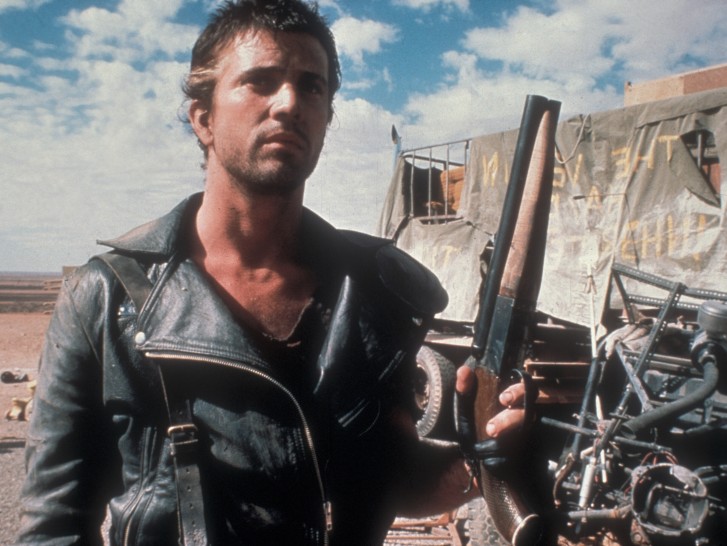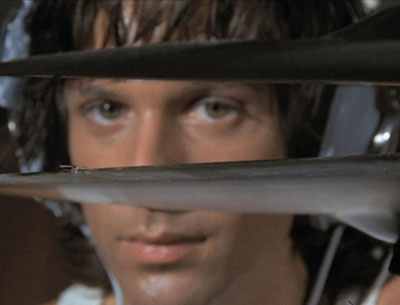
Mad Max 2: The Road Warrior introduction by Ben RIvers.
Transcript
John Quackenbush 0:01
April 11, 2015, the Harvard Film Archive screened The Road Warrior. This is the introduction by filmmaker Ben Rivers.
Ben Rivers 0:13
Thanks for coming. I decided to show this film—well, I made a sort of much longer list for this program, but had to whittle it down from about thirty-something films down to nine, because there was only so much we could fit in. But one of the reasons—well there were kind of two main reasons why I chose this film: One is, I'm here doing a fellowship this year and one of the things that I'm working on is I'm writing a post-apocalyptic movie called After London. And, so I'm kind of brushing up on my post-apocalyptic movies and fiction. And so that was one thing that made me drawn to thinking about this film. But if any of you were here last night, we showed a trailer for a film called A Boy and His Dog, which was a very hard choice between the two. But this one just kind of tipped the balance, the other reason being that there's going to be a new Mad Max film coming out, I think, any day, any week soon. So I thought it'd be nice to tie in with that new film because I think I've got hope for it. Because unlike a lot of remakes and sequels, long after the originals, this one is made by the same director, George Miller, who's directed all four Mad Max movies. You know, so he's really sort of invested in this series. And he's kind of changed it each time. So I don't know, I'm kind of excited to see what happens with the new one. But of the existing three, I think Mad Max 2: The Road Warrior is generally conceived as the best, so far. If you haven't seen Mad Max 1, you kind of don't need to have. It's pretty—you know, the plot is not too deep. The first one is great as well. I mean, it's a much cheaper film. It's much simpler. And it's based more around the idea of a sort of cop revenge, classic cop revenge type thing, where Mad Max is a highway patrolman, and is sort of pitted against an evil bike gang who kill his wife and child, and burn to a crisp his friend.
[LAUGHTER]
Ben Rivers 3:28
And that's pretty much it. You don’t really need to know much more. But that film is set maybe not so far in the future, in a kind of dystopian near-future. Mad Max 2 kind of goes much further. The world has collapsed to a much greater degree. There's probably been some nuclear war. You know, they're just living in this kind of ravaged desert wasteland. And there's a few small settlements of, I guess, good people. And then there's these kind of gangs—marauding gangs—that go around and try to steal gasoline, which is the source of energy, and just generally rape and murder and pillage and just be horrible. And they were like, very—I mean, it's basically S&M gear, which you'll see. I mean, maybe that's what—I don't know, maybe—I haven't been to Australia for a long time, but could be what's happening there, now.
[LAUGHTER]
Ben Rivers 4:46
I don’t know. Any Australians? So yeah, I won't go into the plot for this one because you'll see it. But it is basically, I think, one of the best action movies there's been. And it has these incredible car chase sequences that are up there with the classics. And this is 1981, so it's before special effects and things like that. So it's real cars, real stunt actors risking their lives, and a few sort of prosthetic body parts. And that's about it. I read one nice story about one of the stuntmen, who in one of the major scenes towards the end, there's a big truck scene. Very dangerous. And it was deemed so dangerous that they told him to not eat for twelve hours before doing this stunt, so to make surgery more easy, after the stunt.
[LAUGHTER]
Ben Rivers 6:04
And that's all for your pleasure.
[LAUGHTER]
Ben Rivers 6:08
So I'll leave it at that, and enjoy.
[APPLAUSE]
© Harvard Film Archive
Related film series

Ben Rivers' Midnite Movies: The Witching Hour Part 3, "Because You've Never Known Fear Until it Stabs You in the Eye with a Rusty Nail"
Explore more conversations
Peter Rose

Rebecca Baron & Ernst Karel

Madeline Anderson


